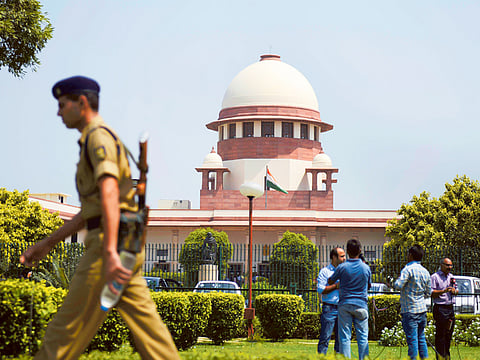Indian Supreme Court to examine legality of polygamy
The practices of ‘nikah halala’ and polygamy are discriminatory, say women’s rights groups

New Delhi: Months after declaring the instant “triple talaq” form of divorce unconstitutional, India’s Supreme Court (SC) on Monday agreed to examine the legal validity of polygamy, as well as “nikah halala” — an Islamic process required to remarry one’s divorced wife.
A Constitution Bench of the court, comprising five of the most senior judges, will next month hear four petitions challenging the legal validity of the two practices.
Bharatiya Janata Party (BJP) lawyer Ashwini Kumar Upadhyay filed a petition, along with two Muslim women and another lawyer from Hyderabad, demanding a ban on polygamy and ‘nikah halala’.
“Banning polygamy and ‘nikah halala’ is the need of the hour to secure basic rights for Muslim women. I know so many women who are victims of polygamy. We want the Supreme Court to look into the plight of thousands of Muslim women across the country,” Upadhyay said.
Over the years, several women’s rights groups have said the practices of ‘nikah halala’ and polygamy were discriminatory.
According to a Hyderabad-based petitioner, whereas the Muslim law allows a man to have multiple wives by way of the temporary marriages or polygamy, the same permission is not extended to women and therefore the law violates the fundamental rights of Muslim women.
While polygamy is the practice of being married to more than one woman, ‘nikah halala’ is a practice meant to curb divorce.
Under ‘nikah halala’, a man cannot remarry his former wife without her going through the process of marrying someone else, consummating that marriage and getting divorced.
Meanwhile, the court on Monday issued notices to the central government and Law Commission asking them to make their stand clear on several such petitions asking for the two practices to be abolished.
The court observed that the five-judge bench which examined instant ‘triple talaq’ last year had kept open the issues of polygamy and ‘nikah halala’.
In its judgment, the top court had described instant ‘triple talaq’ as “bad in law”.
“Instant ‘triple talaq’ is not integral to religious practice and violates constitutional morality,” the court had said.
In August last year, Chief Justice J.S. Khehar had said “we have taken a conscious decision to deal only with triple talaq and not polygamy or ‘nikah halala’”.
When the Attorney-General (AG) requested all three issues to be heard together, Justice Khehar had said, “It does not even happen in T20 cricket that one can take three wickets in one ball.”
Sign up for the Daily Briefing
Get the latest news and updates straight to your inbox



